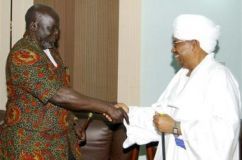Sudanese president signs new constitution; VP installed
KHARTOUM, Sudan, July 9, 2005 (AP) — Sudanese President Omar el-Bashir signed the country’s new constitution Saturday that for the first time lays out freedoms of religion and expression as human rights.

|
|
Sudanese President Omar el Bashir, right, welcomes the leader of the Sudan People’s Liberation Movement John Garang in Khartoum, Sudan, Friday, July 8, 2005. (AP) . |
El-Bashir was then resworn in as president with a pledge to uphold and respect the new charter.
Shortly after the signing former rebel leader John Garang took the oath of office as first vice president, a historic move that many see as the first real evidence of a peace deal signed earlier this year.
Garang, who returned to Khartoum the day before for the first time in 22 years, is now second in power only to the president. He is the first southerner and Christian to hold such a high position in the largely Islamic government.
Garang and President Omar el-Bashir were also to sign an interim constitution that for the first time lays out freedoms of religion and expression as human rights.
A number of foreign dignitaries are expected to attend the ceremony, including U.N. Secretary-General Kofi Annan, U.S. Undersecretary of State Robert Zoellick and South African President Thabo Mbeki. Annan was expected to give a speech later in the day.
Saturday was declared a public holiday because of the events. Announcements on television and radios the day before asked residents to avoid downtown Khartoum, where roads would be blocked off leading to the Republican Palace.
Garang’s appointment is part of a January peace deal that shares power and wealth with long-marginalized southerners. He arrived triumphantly in the capital on Friday for the first time since the civil war began in 1983. He was welcomed by el-Bashir and later by hundreds of thousands of ecstatic Sudanese at a rally in northern Khartoum’s Green Square.
The 60-year-old founder of the Sudan People’s Liberation Army was central to the southerners’ fight for autonomy and greater rights against Khartoum governments that sought to impose Islamic law throughout Africa’s largest nation. Some 2 million people died from fighting, famine or disease as a result of the war, which began in 1983.
Although Islamic law remains the basis of the law, the constitution says it will not be applied in the mainly Christian and animist south, and removes a requirement that the president be Muslim.
In another first, the constitution also allows women as well as men to pass on Sudanese nationality to their children.
It provides for a coalition government, wealth and power sharing and democratic elections within three years. The south will also have a referendum on secession after six years.
